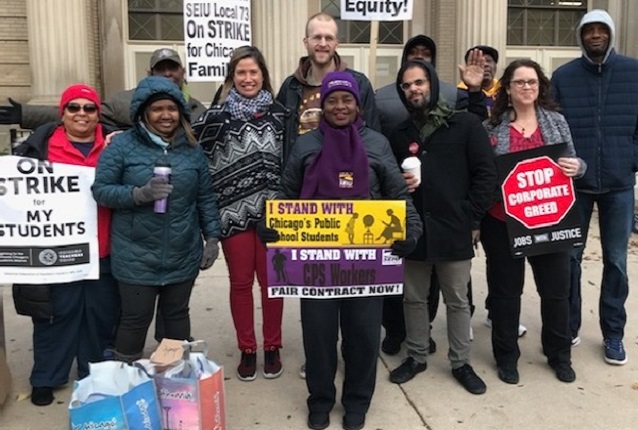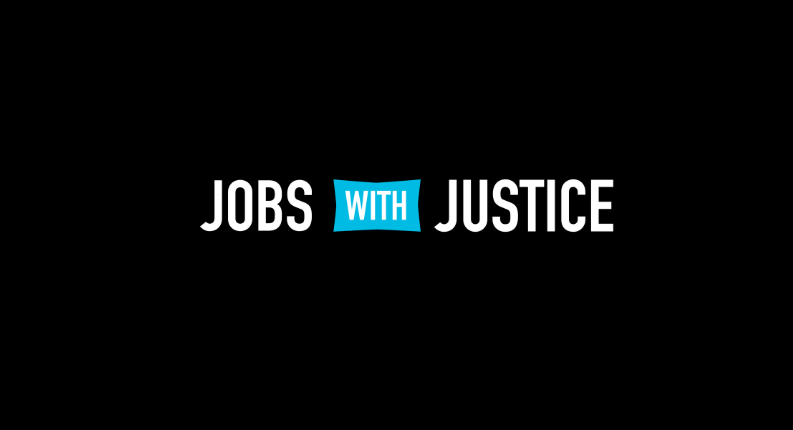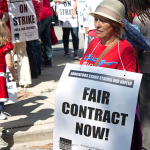On November 15th, Chicago Public Schools’ (CPS) educators approved a landmark new contract. They won the hard-fought victory after going on strike and shutting down the third-largest school district in the United States.
Four weeks earlier, teachers with the Chicago Teachers Union (CTU) and school support staff with SEIU 73 launched a strike to demand “the schools that Chicago students deserve.” This joint strike was a historic show of unity between the 25,000 members of CTU and 7,500 members of SEIU 73. The courage demonstrated by striking workers inspired students, parents, and community partners, including Chicago Jobs With Justice, and together, they mobilized in solidarity with the educators.
Through this fight, the educators of Chicago demonstrated that it is possible to take collective action to confront corporate greed and white supremacy and win bold demands with—and for—the community.
Chicago Jobs With Justice has continued to support campaigns to improve the education system in the city, including the teachers strike at the Chicago Public Schools in 2012, the first charter school strikes in the country launched last December, and the graduate employees strike at the University of Illinois at Chicago in March 2019.
During the recent strike, Chicago Jobs With Justice partnered with Chicago DSA and launched Bread for Ed, a fundraising effort to make sure that students continued to have meals while schools were closed due to the strike. They mobilized overwhelming support and raised over $45,000.
Together with a group of inspiring volunteers, Chicago Jobs With Justice and Chicago DSA distributed brown bag meals for students, teachers, and support staff every day of the strike. They also provided groceries to the striking workers and organized food trucks to provide free meals at the picket lines.
“When we dropped off food on the picket line or handed out groceries, striking workers thanked us. But Bread for Ed was our way of thanking them for showing incredible vision, courage, and solidarity in this struggle. It’s an example for us all,” shared Susan Hurley, the Executive Director of Chicago Jobs With Justice.
This strike is an excellent example of how working people can expand the traditional definition of collective bargaining through the power of Bargaining for the Common Good.
Bargaining for the Common Good is a way for workers to leverage their power to fight for the whole community. In addition to making demands around wages and benefits, the educators called on the city to hire more nurses, librarians, and counselors in schools, and to implement sanctuary policies to protect immigrant students, and address Chicago’s housing crisis.
Through the strike, teachers and school support staff challenged the corporate agenda and the system of white supremacy that are harming their communities. Throughout negotiations Chicago Mayor Lori Lightfoot claimed “there is no more money” for schools despite making promises to invest in public education on the campaign trail less than a year ago. CTU highlighted the city’s willingness to use $1.3 billion in tax increment financing (TIF) funds for Lincoln Yards, a luxury development project, while at the same time refusing to fund public schools. During the strike, CTU members marched to Lincoln Yards and staged a sit-in at the offices of Sterling Bay, the project’s developer. Vice President Stacy Davis Gates told VICE News, “White supremacy in CPS manifests with 40 black kindergartners in one classroom; it manifests when they close 50 black schools; it manifests when we are begging for school nurses to be in schools every day, but instead taxpayers are subsidizing wealthy playgrounds in Lincoln Park.”
School support staff joined in union with SEIU Local 73 won an agreement that included wage increases, better working conditions, and more resources for students. Although SEIU 73 was able to reach an agreement with CPS before CTU, they continued to stand in solidarity with the teachers in their fight to build a better Chicago Public Schools. After eleven days on strike, CTU won a tentative agreement with significant victories including a nurse and a social worker in every Chicago public school, enforceable caps on class sizes, wage increases, sanctuary policies to protect immigrant students, support for students experiencing homelessness, and more.
While they were not able to win everything that Chicago’s students deserve, the courageous strike by members of SEIU 73 and CTU resulted in significant wins and paved the way for other working people to leverage their collective power to challenge the intertwined systems of oppression in this country.







